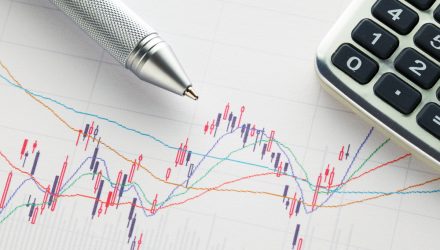The Cboe Volatility index and VIX-related exchange traded funds are surging, and some anticipate that the market volatility will linger as the S&P 500 continues to struggle ahead.
Among the best-performing non-leveraged ETFs of Monday, the iPath Series B S&P 500 VIX Short Term Futures ETN (NYSEArca: VXX) increased 7.3%, and the ProShares VIX Short-Term Futures ETF (NYSEArca: VIXY) advanced 7.1%, briefly testing their long-term resistance at the 200-day simple moving average. Meanwhile, the CBOE Volatility Index climbed 15.9% to 33.45 and touched its highest level since early 2021.
“The charts, as interpreted by Mark Sebastian, suggest that the S&P 500 could remain in the house of pain through early February,” Jim Cramer, the “Mad Money” host, said on CNBC.
Sebastian’s outlook is based on analysis of the CBOE Volatility Index, which measures the implied volatility of S&P 500 options. The VIX was previously hovering around the 17s level back at the turn of 2022.
“It rallied relentlessly for the last three weeks,” Cramer said, which, according to Sebastian, “is bad news for the stock market.”
“When it rises like this, it means that traders have been buying protection for themselves every time the VIX tries to back off,” Cramer added. “Even on days when the market manages to rally, they don’t move to unwind those hedges, they buy more insurance.”
Furthermore, looking at the VIX futures market, options are trading in a state of backwardation, which reflects traders’ expectations of increased volatility in the months ahead.
“In other words, the current volatility index is trading at a premium to the February VIX futures, and the February futures are starting to move above the March futures,” Cramer said.
Ralph Acampora, a long-time market technician known as the “godfather” of technical analysis, also told MarketWatch that the stock market could erase one-fifth of its value this year based on recent volatility, GoBankingRates reports.
“If you had spoken to me on Tuesday I would have said that the market is going to correct [a decline of at least 10%] and I’m now talking 20% or more,” Acampora told MarketWatch last Friday.
Acampora has warned investors to proceed with caution partly because the equity market is due for a correction following the extended bull run. Markets have enjoyed beneficial COVID-era Federal Reserve policies that are slated to end this year as the central bank tightens measures to combat elevated inflation.
For more news, information, and strategy, visit ETF Trends.
